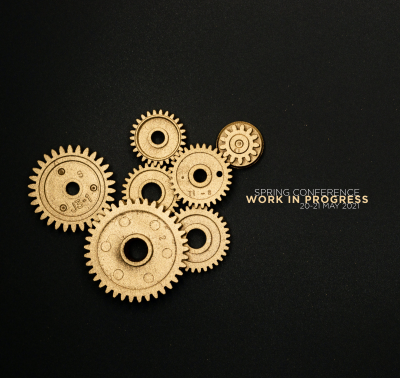THEATRE GREEN BOOK
Through all my research, no-one has asked me why. The questions have been: when do we start; what to do first?
1. Sustainability doesn’t just belong to one person. It will only be achieved if everybody knows what they need to do and expect.
2. Must achieve critical mass, act collectively and develop shared understanding.
The aim is to bring together the creative directors and designers with the sustainability experts, and to discover where the decisions are made.
Why does it matter so much? The climate emergency will change the arts.
Paddy Dillon, architect, author and curator
THE FUTURE OF CO-PRODUCTION
There are 3 reasons which drive co-production: economic; creative, audiences.
Pierre Audi, Director Festival d’Aix-en-Provence
Co-productions will continue to exist, but we need to think more local. Dutch National Opera is collaborating with the two Dutch touring companies in the field of talent development. The lesson of the pandemic reveals the importance of companies working together within the cultural ecosystem. We must be both local and global.
Sophie de Lint, Director of Dutch National Opera
The role of co-production will be reduced and become more selective. There should be an environmental awareness of the life-cycle of a production.
Valentí Oviedo, General Director Liceu Barcelona
Co-production is the cost-effective means to work on quality, and an opportunity to exchange and connect with other countries. This will not change.
Birgit Meyer, Intendantin Oper Köln
Independent producers are dependent on co-production, but they can be more flexible and create lighter shows. It is about bringing forward new talent, placing local artists in an international context.
Guy Coolen, director of O. Festival Rotterdam
Audiences want to see something different. Co-production will remain in the future to ensure a wider repertoire and choice of composers and directors. But it must become more sustainable. We are on a learning curve for digital collaboration.
Henning Ruhe, Opera Director GöteborgsOperan
RENEWING THEATRES
Every new building project must promise sustainability for 100 years. We must ask: what do we want from the opera house of the future?
Birgitta Svendén, General Director Royal Swedish Opera
Vision of new cultural mile in Frankfurt for 2030+. Awaiting new political landscape after elections to explore available sites and properties and define historic preservation. Next steps are vote on location issue; and announcement of architectural competition.
Achim Sieben, International Projects & Referent of Intendant Oper Frankfurt
Public engagement started in Düsseldorf with support of all political parties. New theatre to have twice the footprint of current building, but more inclusive. Setting 10 key criteria for the Opera House of the Future: shaping Düsseldorf as a Cultural City; new standards of environmental Sustainability; shared place for Diverse urban citizens; broad and varied Programme; Innovation and Tradition combined; realise Quality; Economic asset; Lively place to attract young people; cultural beacon in Digital world; ‘Place to be’
Alexandra Stampler-Brown, Managing Director Deutsche Oper am Rhein
Phased renovation of Grand Théâtre to spread cost between public and private sectors. Aim to avoid long closures which interrupt performances.
Aviel Cahn, General Director Grand Théâtre de Genève
PROSPECTS FOR FUNDRAISING
Need to look beyond short-term to life-long support and accelerate creation of new formats for donors.
Julia Hofmann, Head of Friends of Staatsoper Berlin
Lockdown has enabled stronger ties between artists and donors. Focus on Creation; Accessibility; Diversity. A public organisation must reflect all public.
Jean-Yves Kaced, Director Commercial Marketing & Communication Paris Opera
Focus on what we could do, so investment in high quality filming. Streaming and pay-for-view has provided the biggest opportunity to expand the audience and achieve international reach.
Caroline Miller, Executive Director Birmingham Royal Ballet
Use pandemic to confront fragility of old circle of donors and bring new groups into the theatre. Target university students; and families.
Alessandra Sbriscia Fioretti, Marketing, Fundraising and Special Projects Manager Fondazioni I Teatri Reggio Emilia
Regular contact with donors more important than ever during pandemic; and determination to overcome the challenges of presenting public performances.
Marisa Vázquez-Shelly, Director of Sponsorship Teatro Real Madrid
NEXT GENERATION OF TALENT
European Opera Academy aims to be international; relevant to society; innovative. Future labour market is unsure, so artists must prepare for freelance work with small companies and develop entrepreneurship and digital skills.
Joachim Junghanss, Artistic Director Conservatorium Maastricht
Not enough skills are taught in Polish conservatoires. Singers need protection and support to survive the pressure and build relations with agents.
Beata Klatka, Coordinator Young Artist Programme Polish National Opera
International opera studio is a stepping-stone between the protective bubble of high school and the life of employment. Need to learn languages, body training, stamina, cultural background, career planning and self-estimation; and to train versatile voices with good communication.
Boris Ignatov, Casting Director Oper Stuttgart
Less time on stage last year meant benefiting from more time studying, which helped singers to become more ready for challenges; and for mentoring to build mental strength and discipline and intellectual background.
Eleonora Pacetti, Director of Fabbrica Young Artists Programme Rome Opera
An artist manager must play the role of ‘bad guy’, and risk being negative. Sustainability is not appreciated enough in this business. There is a lack of feedback culture. Singers need professional feedback from several sources.
Boris Orlob, Managing Director of Boris Orlob Management Berlin
Opera for Peace is a platform for artists to be related to the world and at the heart of society. Relevance is the key to success. Young people want to be part of the solution and impact on those around them. Singers feel isolated. Technology and social media confer openness and support long-term success.
Julia Lagahuzère, General Director Opera for Peace


